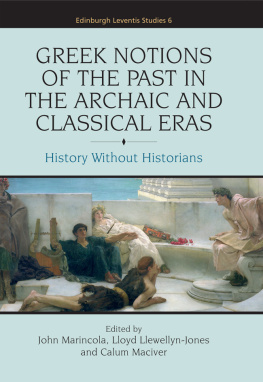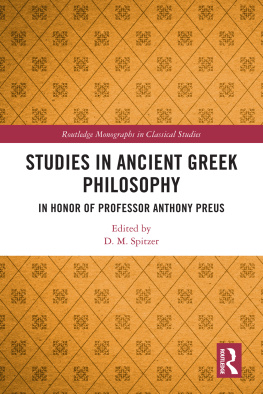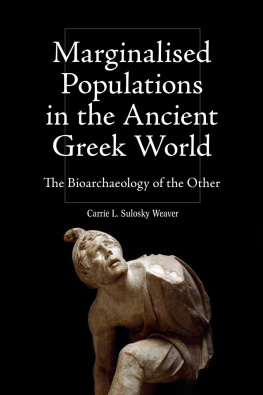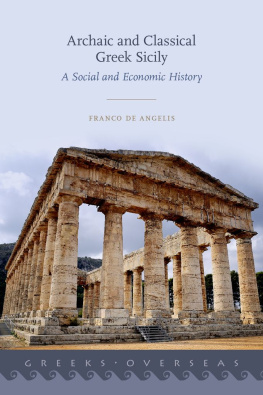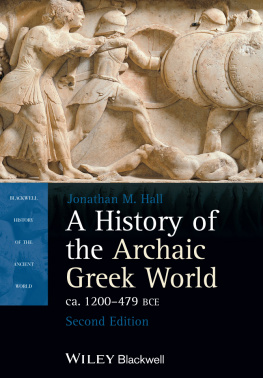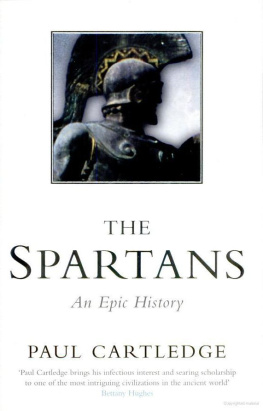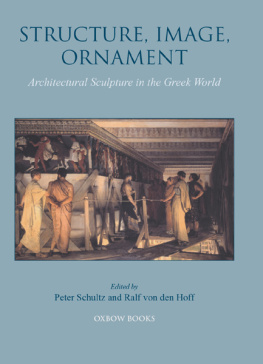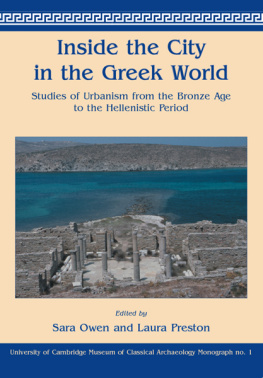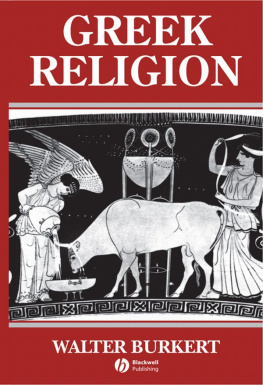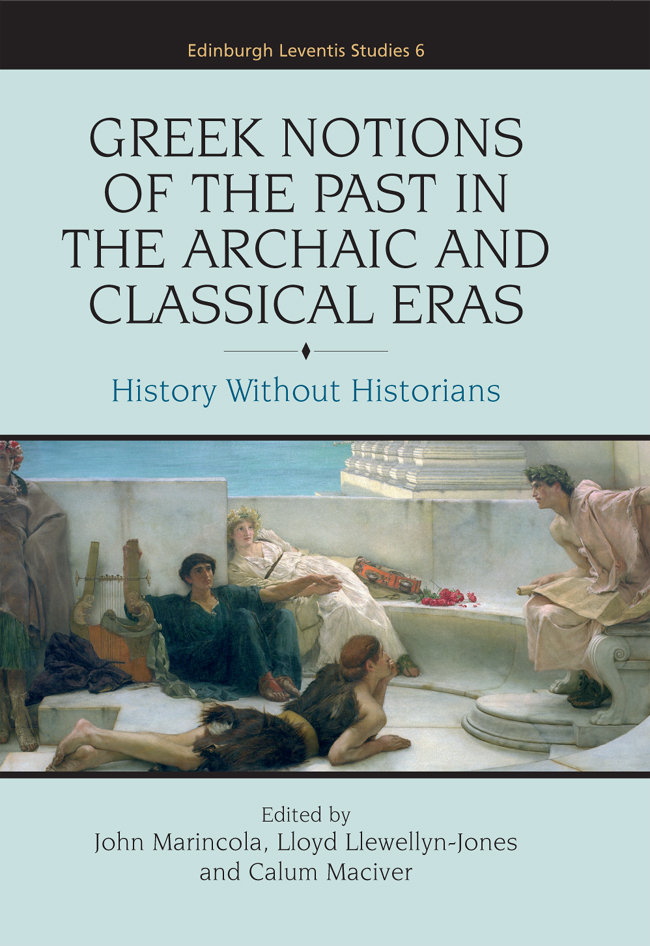EDINBURGH LEVENTIS STUDIES 6
Previously published
Edinburgh Leventis Studies 1
Word and Image in Ancient Greece
Edited by N. Keith Rutter and Brian A. Sparkes
Edinburgh Leventis Studies 2
Envy, Spite and Jealousy: The Rivalrous Emotions in Ancient Greece
Edited by David Konstan and N. Keith Rutter
Edinburgh Leventis Studies 3
Ancient Greece: From the Mycenaean Palaces to the Age of Homer
Edited by Sigrid Deger-Jalkotzy and Irene S. Lemos
Edinburgh Leventis Studies 4
Pursuing the Good: Ethics and Metaphysics in Platos Republic
Edited by Douglas Cairns, Fritz-Gregor Herrmann and Terry Penner
Edinburgh Leventis Studies 5
The Gods of Ancient Greece: Identities and Transformations
Edited by Jan N. Bremmer and Andrew Erskine
Edinburgh Leventis Studies 6
Greek Notions of the Past in the Archaic and Classical Eras: History
without Historians
Edited by John Marincola, Lloyd Llewellyn-Jones and
Calum Maciver
EDINBURGH LEVENTIS STUDIES 6
GREEK NOTIONS OF THE
PAST IN THE ARCHAIC AND
CLASSICAL ERAS
History without Historians
Edited by
John Marincola,
Lloyd Llewellyn-Jones and
Calum Maciver
EDINBURGH
University Press
editorial matter and selection, John Marincola, Lloyd Llewellyn-Jones and
Calum Maciver, 2012
in the individual contributions is retained by the authors, 2012
Edinburgh University Press Ltd
22 George Square, Edinburgh EH8 9LF
www.euppublishing.com
Typeset in 11/13pt Times NRMT
by Servis Filmsetting Ltd, Stockport, Cheshire, and
printed and bound in Great Britain by
CPI Group (UK) Ltd, Croydon CR0 4YY
A CIP record for this book is available from the British Library
ISBN 978 0 7486 4396 7 (hardback)
ISBN 978 0 7486 4397 4 (webready PDF)
ISBN 978 0 7486 5466 6 (epub)
ISBN 978 0 7486 5465 9 (Amazon ebook)
The right of the contributors
to be identified as author of this work
has been asserted in accordance with
the Copyright, Designs and Patents Act 1988.
CONTENTS
PREFACE
This volume brings together revised versions of papers originally presented at the Sixth A. G. Leventis conference, History without Historians: Greeks and their Past in the Archaic and Classical Era, which was held at the University of Edinburgh, 57 November 2009. The conference was an attempt to get at the issue of what we would know about Greek conceptions of the past if we lacked the historiographical texts of Herodotus, Thucydides and others.
J.M. would like to thank the Classics Department at the University of Edinburgh for the honour of naming him the A. G. Leventis Chair in Greek Studies in 2009. The hospitality shown by the department and the School of History, Classics and Archaeology during his stay was extraordinary, and he thanks in particular Sandra Bingham, Glenys Davies, Elaine Hutchison, Gavin Kelly, Lloyd Llewellyn-Jones, Wendy and Keith Rutter, and last but assuredly not least his nonpareil assistant, Kate Collingridge. At a later stage he benefited (as always) from the sage advice of Christopher Pelling. He also thanks his research assistant, Anastasia Belinskaya, for her help in compiling the Index Locorum.
We are grateful to the Department for its care in putting on the conference and in making it such a wonderful occasion. We also offer thanks to Fiona Sewell, our excellent copy-editor, and especially to Carol Macdonald, our editor, who encouraged and supported the project from the beginning and patiently awaited the final version.
Tallahassee, Edinburgh, Leeds
J.M.
L.L-J.
C.M.
ILLUSTRATIONS
. |
. Photo: Runion des Muses Nationaux. |
. |
. |
. Photo: museum. |
. Photo: museum. |
. |
. Photo: museum. |
. Photo: museum. |
. |
. |
. Photo: museum. |
. Photo: museum. |
11.1a
& b | . |
11.2a
& b | . |
11.3a
& b | . |
. |
. |
. |
. |
. |
. |
. |
. |
. |
NOTES ON CONTRIBUTORS
Deborah Boedeker is Professor Emerita of Classics at Brown University. From 1992 to 2000 she directed Harvards Center for Hellenic Studies in Washington, DC, jointly with Kurt Raaflaub. Her publications focus on early Greek poetry, tragedy, historiography and religion; she is especially interested in how these areas interact with each other in the development of a shared past.
Ewen Bowie was Praelector in Classics at Corpus Christi College, Oxford, from 1965 to 2007, and successively University Lecturer, Reader and Professor of Classical Languages and Literature in the University of Oxford. He is now an Emeritus Fellow of Corpus Christi College. He has published articles on early Greek elegiac, iambic and lyric poetry; on Aristophanes; on Hellenistic poetry; and on many aspects of Greek literature and culture from the first century BCE to the third century CE, including Plutarch and the Greek novels. He has recently edited (jointly with Ja Elsner) a collection of papers on Philostratus (2009) and (jointly with Lucia Athanassaki) a collection of papers entitled Archaic and Classical Choral Song (2011) and is currently completing a commentary on Longus, Daphnis and Chloe, for Cambridge University Press .
Bruno Currie is Monro Fellow and Tutor in Classics at Oriel College, Oxford, and Lecturer at Oxford University. He is the author of Pindar and the Cult of Heroes (2005), and of various articles on Greek epic and lyric poetry.
Lin Foxhall is Professor of Greek Archaeology and History at the University of Leicester, and has held posts at St Hildas College, Oxford, and University College London. She has worked in Methana, the southern Argolid, Sparta and Metaponto. She currently codirects a field project in Bova Marina, southern Calabria, Italy. She has written extensively on agriculture, land use and gender in classical antiquity and has published Olive Cultivation in Ancient Greece: Seeking the Ancient Economy (2007) and Studying Gender in Classical Antiquity (2012).
Simon Goldhill is Professor of Greek at the University of Cambridge. He is also a fellow of Kings College, Cambridge, Director of the Cambridge Centre for Research in Arts, Social Sciences and the Humanities, and a fellow of the American Academy of Arts and Sciences. He has published broadly on Greek literature, especially on Greek tragedy, and on Victorian culture. His most recent books are Victorian Culture and Classical Antiquity: Art, Opera, Fiction and the Proclamation of Modernity (2011) and Sophocles and the Language of Tragedy (2012).
Jonas Grethlein is Professor of Classics at Heidelberg University. His recent publications include The Greeks and their Past: Poetry, Oratory and History in the Fifth Century BCE (2010) and, co-edited with C. Krebs, Time and Narrative in Ancient Historiography: The Plupast from Herodotus to Appian (2012).
Jeffrey Henderson is the William Goodwin Aurelio Professor of Greek Language and Literature, and former Dean of the College and Graduate School of Arts and Sciences, at Boston University. Since 1998 he has been the general editor of the Loeb Classical Library. His many publications include

